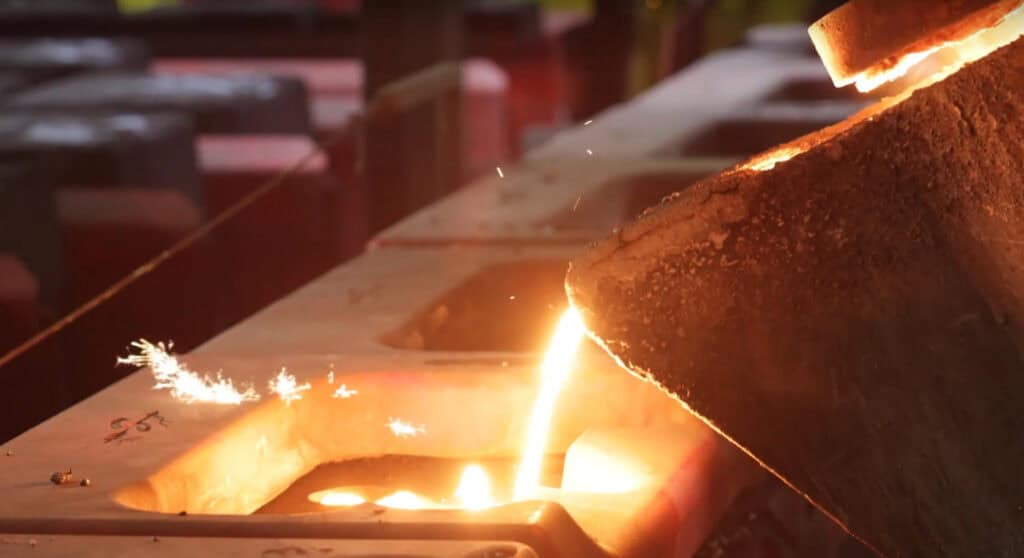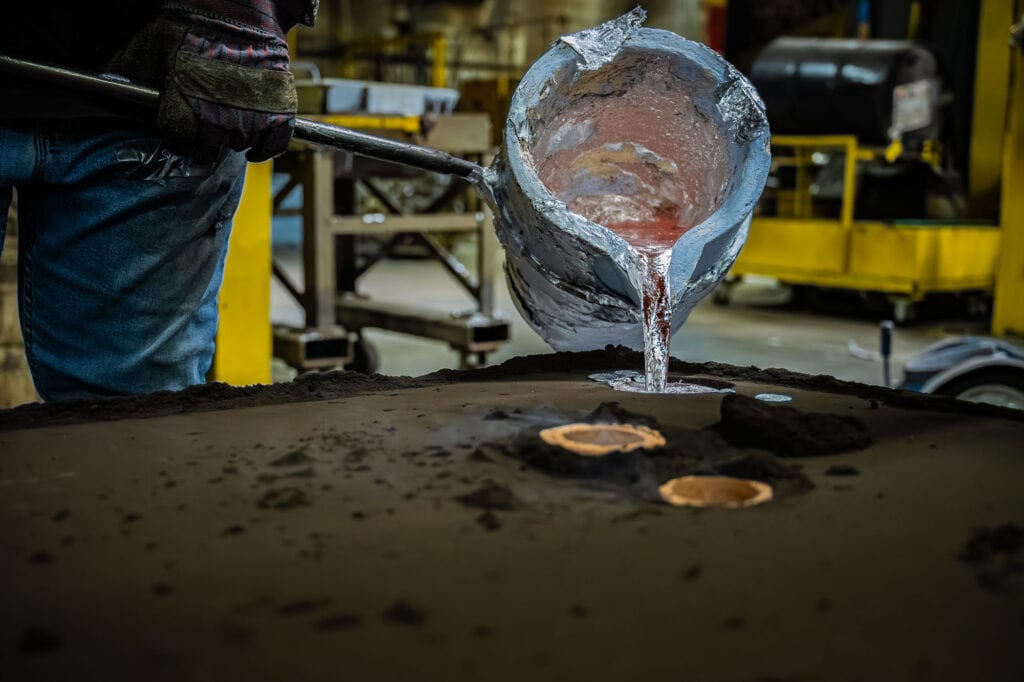How inspection systems ensure precision and excellence in every Metal Foundry pour
Just How a Metal Foundry Adds To Lasting Metal Manufacturing Practices
Metal foundries play a necessary role in promoting sustainability within the metal production industry. By including recycled products, they decrease reliance on virgin sources and decrease environmental impacts. Energy-efficient melting processes better minimize energy consumption and discharges. The trip toward sustainable practices includes even more than simply reusing and power management. It encompasses a wider commitment to honest sourcing and ingenious modern technologies. The effects of these practices are substantial and warrant more detailed assessment.
The Function of Recycling in Metal Foundries
While metal production has actually commonly depended on virgin products, the boosting emphasis on sustainability has actually resulted in a considerable shift in practices, specifically in metal foundries. Recycling has actually emerged as a vital part of this change, permitting foundries to repurpose scrap metal and decrease reliance on mined sources. By integrating recycled products into their procedures, foundries not only lower environmental influence however additionally lower production prices.
Making use of recycled steels, such as copper, aluminum, and steel, lessens energy consumption and reduces greenhouse gas exhausts related to conventional mining and refining methods. In addition, foundries can accomplish premium results by utilizing advanced sorting and handling innovations to guarantee the pureness of recycled materials. This focus on recycling fosters a round economic climate, where waste is reduced, and sources are utilized efficiently. Metal foundries play an essential duty in promoting sustainable practices within the metal manufacturing sector.
Energy-Efficient Melting Techniques
Energy-efficient melting methods are essential for improving sustainability in metal manufacturing. These methods substantially reduce energy intake throughout the melting procedure, which is one of one of the most energy-intensive stages in metal production. Technologies such as induction melting, resistance home heating, and microwave melting deal improved effectiveness compared to typical approaches. Induction melting, for example, utilizes magnetic fields to create warmth straight within the metal, minimizing energy loss and supplying exact temperature level control.
Additionally, executing warm healing systems can better enhance efficiency by capturing and reusing waste warm produced during melting. Utilizing sophisticated insulation products and maximizing heater layouts also contribute to power savings. By adopting these innovative melting techniques, metal foundries can lower their carbon impact, lower functional expenses, and contribute to a more lasting production landscape. The assimilation of energy-efficient techniques not just lines up with ecological objectives but also fulfills the expanding need for accountable production methods in the metal industry.
Sustainable Sourcing of Raw Products
Lasting sourcing of basic materials is necessary for lessening the environmental impact of metal production. This entails the boosted use of recycled metals, the adoption of moral mining methods, and initiatives focused on local sourcing. By focusing on these methods, the industry can promote responsible source management and assistance regional economic climates.

Recycled Metal Utilization
Just how can markets properly reduce their environmental influence while fulfilling the growing demand for metal? One significant strategy is the usage of recycled metal. By incorporating scrap metal right into their manufacturing procedures, foundries can lower the removal of virgin products, consequently conserving natural resources and decreasing power usage. Recycled steels require less energy to procedure contrasted to their raw counterparts, causing reduced greenhouse gas discharges. Additionally, using recycled metal assists divert waste from garbage dumps, promoting a circular economic climate. Industries that prioritize recycled metal not just add to sustainability yet also take advantage of expense financial savings connected with reduced material procurement. As a result, recycled metal application stands as a vital method for eco liable metal manufacturing.
Ethical Mining Practices
While the need for steels proceeds to climb, markets are increasingly acknowledging the value of honest mining methods in making certain accountable sourcing of basic materials. Ethical mining incorporates a dedication to ecological stewardship, social obligation, and adherence to fair labor techniques. Business are now prioritizing collaborations with mines that show transparency in their operations, minimizing ecological influence and appreciating regional communities. This approach not just cultivates a lasting supply chain however also boosts the online reputation of organizations included. By executing strenuous criteria and accreditations, industries can battle unlawful mining activities and advertise the welfare of employees. Inevitably, honest mining practices add considerably to a much more sustainable metal manufacturing environment, lining up economic development with environmental and social stability.
Local Sourcing Campaigns

Advancements in Metal Casting Procedures
Developments in metal casting processes are transforming the sector by including innovative recycling methods that lessen waste. Energy-efficient melting approaches are likewise being created to lower power consumption during manufacturing. Furthermore, making use of ingenious mold materials adds to improved performance and Resources sustainability in casting procedures.
Advanced Recycling Techniques
Advanced recycling techniques are changing metal casting procedures, significantly boosting sustainability in the industry. These technologies concentrate on recycling and reclaiming scrap metal, substantially minimizing waste and the need for virgin products. Techniques such as hydrometallurgy and pyrometallurgy allow foundries to draw out valuable steels from used parts, guaranteeing effective source application. Furthermore, progressed sorting and purification technologies improve the top quality of recycled steels, making them suitable for high-performance applications. This not only decreases the environmental impact of metal production however likewise fosters a circular economy by promoting the reuse of products. As these reusing approaches remain to advance, they promise to further enhance operations within foundries and add to an extra lasting metal production landscape.
Energy-Efficient Melting Methods
While typical melting methods have long been the backbone of metal casting, current improvements have actually presented energy-efficient strategies that substantially reduce power usage and discharges. Technologies such as induction melting and electrical arc furnaces have actually gotten importance, enabling accurate control over temperature and lowering the need for fossil gas. These methods not only enhance energy effectiveness however additionally advertise quicker melting times, which equates to decrease functional prices. Furthermore, innovations in heat healing systems make it possible for foundries to capture and reuse excess heat created throughout the melting procedure. This alternative approach to power administration not only sustains sustainable techniques yet additionally placements metal foundries as leaders in the change towards greener production processes, even more aligning with worldwide sustainability goals.
Innovative Mold Materials
As the demand for more efficient and lasting metal casting processes expands, the exploration of innovative mold materials has actually become a centerpiece in the sector. Traditional mold and mildew materials frequently add to ecological difficulties, triggering the search for options that lower waste and energy intake. Recent developments consist of the growth of recyclable compounds and biodegradable binders, which not only enhance mold performance yet likewise lessen eco-friendly impact. Additionally, the usage of 3D printing technology in mold creation allows for complex designs that reduce product usage and make it possible for fast prototyping. These ingenious materials not only boost casting accuracy yet also straighten with sustainability objectives, showcasing the market's commitment to reducing its carbon footprint while preserving top notch manufacturing requirements.
Decreasing Waste Through Advanced Modern Technology
Innovative modern technologies are changing the metal manufacturing industry by substantially decreasing waste and enhancing effectiveness. Advanced data analytics and maker discovering formulas make it possible for foundries to optimize manufacturing processes, recognizing inefficiencies and reducing scrap material. Smart sensors monitor tools efficiency in real-time, enabling predictive maintenance that decreases downtime and waste generation. Additionally, additive manufacturing strategies, such as 3D printing, enable the production of complicated parts with minimal material usage, considerably reducing waste contrasted to conventional techniques.
Closed-loop systems are becoming more prevalent, wherein scrap metal and byproducts are reused back right into the manufacturing cycle, making certain that materials are utilized to their greatest possibility. This integration of innovation not just advertises resource preservation however additionally enhances the general sustainability of metal manufacturing methods. By accepting these innovations, foundries can add to a more lasting future while preserving competitiveness in the marketplace
The Impact of Foundries on Carbon Impact Reduction
Foundries play a crucial function in reducing the carbon footprint of the metal production sector by executing various lasting practices. By utilizing energy-efficient innovations, such as electric arc furnaces, these centers substantially reduced greenhouse gas discharges contrasted to conventional techniques. Furthermore, foundries increasingly adopt renewable resource sources, which likewise diminishes their reliance on nonrenewable fuel sources.
Reusing scrap metal is Read Full Report another vital method that foundries employ, conserving sources and decreasing the requirement for virgin materials. This not only decreases waste yet also reduces the energy-intensive extraction procedures connected with mining. Additionally, the fostering of closed-loop water supply assists to decrease water use and reduce wastewater discharge, adding to an extra lasting procedure.
With these efforts, foundries show their dedication to environmental stewardship, bring about a significant decrease in the overall carbon impact of the metal production market. Their continuous efforts are essential in the change towards a more sustainable commercial landscape.
Often Asked Inquiries
What Kinds of Metals Are A Lot Of Typically Recycled in Foundries?
Aluminum, steel, brass, and copper are amongst the most commonly recycled metals in foundries. These metals are preferred due to their high recycling prices, economic worth, and widespread accessibility, adding substantially to industrial sustainability initiatives.
How Do Foundries Make Certain the High Quality of Recycled Products?
Foundries ascertain the quality of recycled products through rigorous screening, sorting, and purification procedures. They execute advanced innovations to examine composition and get rid of contaminations, ensuring that the recycled steels meet sector criteria for performance and security.
What Accreditations Exist for Lasting Foundry Practices?
Various qualifications exist for lasting foundry methods, consisting of ISO 14001 for environmental administration, ISO 50001 for energy management, and LEED qualification for lasting structure techniques (Aluminum Casting). These certifications aid guarantee adherence to environmental this post and sustainability standards in procedures
Exactly How Do Foundries Gauge Their Carbon Impact Decrease?
Foundries determine carbon footprint reduction via devices like lifecycle assessments, energy audits, and exhausts tracking systems. They contrast baseline exhausts to present outcomes, examining improvements in energy efficiency, material usage, and renewable resource adoption over time.
What Are the Financial Advantages of Lasting Metal Manufacturing?
Sustainable metal manufacturing provides economic advantages such as decreased operational prices, increased effectiveness, enhanced market competitiveness, and prospective government rewards. In addition, it fosters development and attracts ecologically aware consumers, inevitably driving long-lasting earnings for services.
Metal foundries play an essential function in advertising sustainability within the metal manufacturing sector. While metal manufacturing has actually commonly depended on virgin materials, the increasing emphasis on sustainability has actually led to a considerable shift in practices, specifically in metal foundries. By including scrap metal into their production processes, foundries can decrease the removal of virgin products, consequently preserving natural resources and lowering power consumption. Foundries play an essential function in reducing the carbon footprint of the metal production market by carrying out various lasting methods. Reusing scrap metal is an additional important method that foundries utilize, saving sources and minimizing the demand for virgin products.